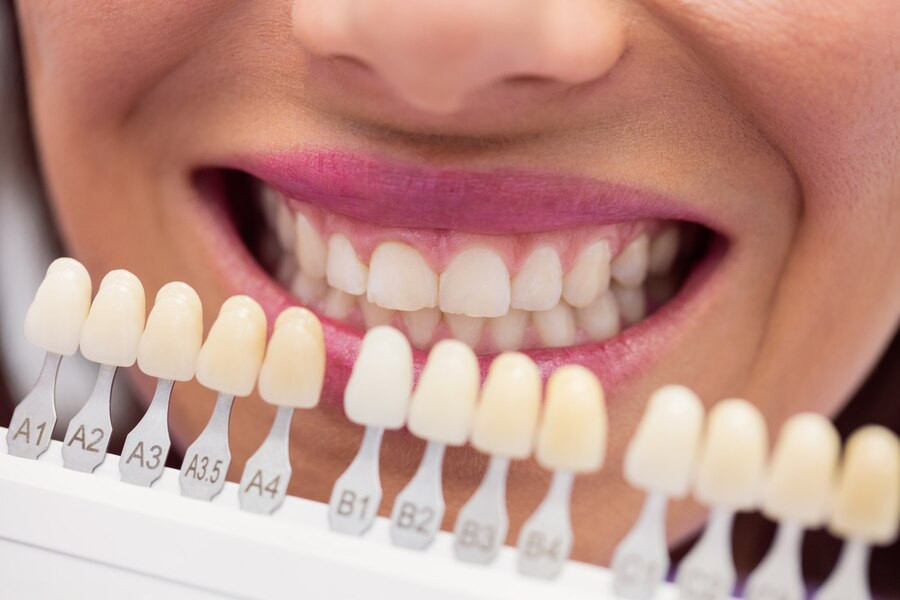Many people dream of having even, neat, and white teeth. How can you achieve a brilliant smile with beautiful teeth? Perhaps dental veneers are the solution.
Before opting for dental veneers, be aware of the benefits and risks involved.
What are dental veneers?
Dental veneers are a method to improve the appearance of uneven and stained teeth. They are thin layers of porcelain or composite resin that are permanently affixed to the front surfaces of teeth.
Typically, dental veneers are fitted after the dentist scrapes the teeth to remove the tooth enamel layer. The veneers are then attached to the teeth with a special adhesive material to create an aesthetically pleasing smile.
Dental veneers are chosen because they make teeth appear more natural. Porcelain veneers, in particular, outperform natural teeth in terms of stain resistance.
Once in place, dental veneers require the same level of care as natural teeth, including regular brushing, flossing, and dentist visits. With proper care, dental veneers can last for 10–15 years or longer.
Benefits of Dental Veneers
Dental veneers offer several aesthetic and functional advantages:
- Improved Smile Appearance: They cover stains, gaps, or irregular teeth
- Natural Look: Available in a variety of colors and shapes to match the surrounding teeth
- Stain Resistance: More resistant to stains compared to natural tooth enamel
- No Additional Maintenance: Properly fitted veneers require only regular brushing and flossing, just like natural teeth
- Long-Lasting: With proper care, veneers can last a long time, making them a profitable long-term investment. They also give your teeth an attractive appearance
Risks of Dental Veneers
While dental veneers provide numerous benefits and advantages for improving the aesthetic appeal of your teeth, there are some risks and drawbacks to consider before undergoing the procedure, including:
- Loss of natural enamel
The process of placing veneers involves scraping away some of the natural tooth enamel to create enough space for the veneer to be placed. During this process, the tooth enamel will not be able to regrow.
- Cannot be restored to its original condition
Certain types of veneers, particularly porcelain, cannot be removed. Removing or replacing them in the future may require additional procedures, depending on the case.
- Tooth sensitivity
Increased sensitivity to heat and cold can occur after veneer placement due to enamel cutting or adhesive material. This could be due to the cutting of the enamel or the effects of the adhesive material used during veneer placement.
- Possibility of veneer detachment
Although rare, veneers can come loose due to physical trauma or bad habits, like using teeth to open hard objects
- High costs and no insurance coverage
Often considered a cosmetic procedure, veneers are usually not covered by health insurance and can be expensive. The cost of installing and maintaining veneers is solely your responsibility.
- Additional care needed
Additional Care Needed: Extra precautions may be necessary, such as avoiding chewing on hard objects, not using teeth to open packages, wearing a retainer if you grind your teeth at night, and wearing a mouth guard while participating in sports, particularly those that can cause injury.
These are the advantages and disadvantages to consider before getting dental veneers. Last but not least, you should consult a doctor to determine whether they are appropriate for you.
If you need medical advice or consultation, you can either visit a doctor or make use of the consultation features that are available in the Ai Care application by downloading the Ai Care application from the App Store or Play Store.
Looking for more tips and health tricks, first aid, and home remedies? Click here!
- dr Nadia Opmalina
Robert Beck (2023). Dental Veneers. Available from: https://www.webmd.com/oral-health/veneers
Cleveland Clinic (2022). Veneers. Available from: https://my.clevelandclinic.org/health/treatments/23522-dental-veneers
Ana Gotter and Jennifer Larson (2023). What to Know Before You Get Dental Veneers. Available from: https://www.healthline.com/health/dental-veneers#which-veneers-are-best
John Hopkins Medicine. Sensitive Teeth: Why They Hurt and How to Stop the Pain. Available from: https://www.hopkinsmedicine.org/health/conditions-and-diseases/sensitive-teeth












